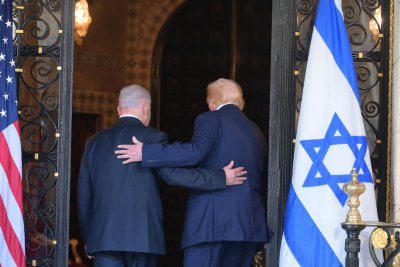Netanyahu accepts Trump’s invitation to join Board of Peace

Jan. 21 (UPI) — Prime Minister Benjamin Netanyahu of Israel on Wednesday accepted the invitation of U.S. President Donald Trump to join his intergovernmental Board of Peace organization as questions — and concerns — loom over its potential members.
The prime minister’s office announced the decision in a statement published on its Facebook account, making Netanyahu the latest world leader to join the board.
Trump has been courting world leaders to join the board, which he first announced in September as part of a 20-point plan aimed at securing a cease-fire in Gaza.
So far, at least eight nations, including Israel, have publicly stated they will join the Board of Peace, a U.S.-led intergovernmental organization that has been endorsed by the United Nations Security Council in relation to its Gaza peace mandate.
Other nations include Argentina, Belarus, the United Arab Emirates, Morocco, Vietnam, Kazakhstan, and Hungary, while invitations have been sent out to several others, including Canada, Britain, France and Russia, among others.
While conceived as a mechanism to maintain peace in Gaza, the board’s charter makes no reference to the Palestinian enclave. The suggestion that it could seek to address other conflicts has raised concerns that it may undermine the United Nations, a frequent target of Trump.
Asked Tuesday during a White House press conference if he wants the Board of Peace to replace the U.N., Trump said, “it might.”
“I wish the United Nations could do more. I wish we didn’t need a Board of Peace,” he said, later adding, “The U.N. just hasn’t been very helpful. I’m a big fan of the U.N. potential, but it has never lived up to its potential.”
Trump has confirmed that an invitation to join the board has been sent to Russia’s authoritarian president, Vladimir Putin, whose potential inclusion has also raised concerns, along with the inclusion of Netanyahu, who is the subject of an International Criminal Court arrest warrant for alleged war crimes, and Alexander Lukashenko, the authoritarian leader of Belarus who aided Russia in its invasion of Ukraine.
Britain — whose leader, Prime Minister Keir Starmer, has been invited to join the board — has signaled that it may decline the offer.
Speaking in the House of Commons on Tuesday, Britain’s Foreign Secretary Yvette Cooper said the proposal for the board being presented now is “very different” from what had been expected.
She also said, “Putin is not a man of peace and I don’t think he belongs in any organization with peace in the name.”
France is reportedly preparing to decline joining the board, which led Trump on Tuesday to threaten a 200% tariff on French wine and champagne in response.
Membership on the board also reportedly costs $1 billion, which Canada said it will not pay although it does intend to join.
Speaking to reporters at the World Economic Forum in Switzerland on Tuesday, Finance Minister Francois-Philippe Champagne said that “there’s a lot of details to be worked out but, one thing which is clear is that Canada is not going to pay if we join the Board of Peace.”
